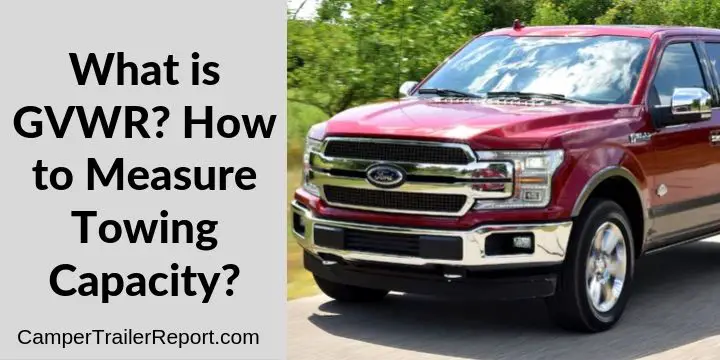
What is GVWR? How to Measure Towing Capacity?
Every vehicle has its unique GVWR; this is the gross vehicle weight rating also referred to as the gross vehicle weight; GVM. This term is mostly used in the motor vehicle industry, especially for heavy loading vehicles.
This is because there is a required capacity for these vehicles to carry to ensure that the roads aren’t damaged. Although this is also used in all other vehicles the term gross vehicle weight includes the vehicle weight itself and the weight of load or passengers if any.
The chassis and all the other build-up materials are weighed including the fuel that has been put in the vehicle to facilitate its movement.
> You may also like:45 RV Accessory Must-Haves for Your Travel Trailer<<
Who Determines the GVWR of a Vehicle?
The GVWR limit of a vehicle is mostly determined by the producer of the vehicle. This is determined by verifying various factors related to the mechanical makeup of the vehicle.
First of all, the producer will have to determine the base curb in terms of the weight of the vehicle and the total weight or number of passengers that can be accommodated in the vehicle.
Determining and indicating a vehicle’s GVWR is a good precaution or safety measure of preventing accident occurrence. A vehicle that has been loaded beyond its GVWR weight capacity can be very dangerous since this may cause serious problems like the braking system not being reliable as they can’t slow down the heavier load.
Due to too much pressure as a result of overloading beyond the GVWR, the tires will not last for long. The pressure will force them to burst. This can be very serious to the extent that heat is generated thus causing a fatal accident.
GVWR weight capacity is also very important for towing vehicle workers. This helps to determine the weight that a towing vehicle can be able to accommodate.
Video Overview: Vehicle Weight Ratings Explained (GVWR, GCWR, GAWR, GTWR) with HaulGauge founder Michael Hall
Video Overview: UNDERSTANDING GVWR & PAYLOAD VS TOW RATINGS
> You may also like:Worst 5th Wheel Brands to Avoid <<
Towing capacity
The term towing capacity is best defined as the highest weights your vehicle can troll at its best condition. One of the best ways to determine the towing capacity of a vehicle is by consulting the producer.
They are the ones who label or have accurate GVWR of the vehicle which is necessary for determining the towing capacity of the vehicle. This explains the close relationship between GVWR and the towing capacity of a vehicle.
It is also important to determine the GVWR of the towed vehicle or even machine. This will help in determining the rightful equipment to be used for the process.
Determining towing capacity entails not only the GVWR only but also GAWR and even GTW. This is all labeled or given by the producer. Most of the vehicles have the towing capacity weight labeled on the body of the vehicle or given out together with the manual.
The weight capacity and GVWR in general of the towing vehicle should be higher as compared to the towed vehicle such that the vehicle can operate well and tow the other without difficulties such as a loosened brake system.
Video Overview: How Much Can I Tow? – Towing & Payload Capacity Explained- MUST WATCH IF TOWING!
The towing capacity of a vehicle can also be determined by the owner who compares the weights of both of the vehicles. When the vehicle is heavier, the towing capacity of the vehicle has to be very high, although the weight can never be higher than the one of the vehicle pulling.
There are also other factors to consider such as the tongue weight; TW. This is affected by the load or passengers and can directly affect the towing capacity. It is important to determine the tongue weight as it can cause a change in the weight.
Tongue weight can also be handled by removing the materials if it causes a shift in terms of weight. Most of the time, the highest or maximum towing capacity of any vehicle includes everything that makes up the mechanical buildup of the vehicle, the various load, and even the passengers if any.
All of them even including individuals on board are said to be the cargo weight. This just like the TW affects the towing capacity. Other vehicles such as load trucks have been built such that they have a way of compensating for the weight difference. This is achieved for example by the addition of extra wheels which in turn adds more weight and achieves control.
Video Overview: PAYLOAD PROBLEMS: HOW MUCH CAN I (REALLY) TOW? RV Truck & Trailer
You may also like: 25 Best National Parks in the USA <
Related Questions:
Is GVWR the same as towing capacity?
No. GVWR is the maximum permissible weight of the vehicle. Towing capacity is the maximum weight of a trailer you can tow. There needs to be a specific load rating for trucks and trailers for each combination for GVWR because a large truck or heavy trailer will have less towing capacity than a lighter one.
In fact, if you exceed your vehicle’s GVWR by even 500 lbs., it could affect its handling, braking, and acceleration capabilities.
2. What does 7000 GVWR mean on a truck?
This rating is from the manufacturer and gives you the maximum permissible weight of the vehicle. The rating will not include a trailer, because you need to specify that separately when ordering a new truck or ordering a custom-built truck.
A general rule is that if you have a GVWR of 12,000 lbs., then the maximum weight of your trailer should only be 7,000 lbs. Remember this measurement includes both vehicles!
Video Overview: GVWR – What Is It? Vehicle Weight Ratings Explained (GVWR, GCWR) w/All About Trailers
3. What is the difference between GVW and GVWR?
There is no difference. The terms are interchangeable. They both refer to the maximum permissible weight of the vehicle, full or empty, including all payload capacity.
>> You may also like: 15 Most Underrated National Parks in America <<
4. How do I find my towing capacity?
The best way to determine your towing capacity is by referring to a provided brochure that comes with your truck, or by calling the manufacturer of your vehicle or trailer (not necessarily available online).
5. How heavy of a trailer can I tow?
The best way to determine how much you can tow is by referring to a provided brochure that comes with your truck, or by calling the manufacturer of your vehicle or trailer (not necessarily available online).
6. Does GVWR include a trailer?
GVWR only includes the truck or trailer; if you want to purchase a fully-loaded vehicle, you need to know the weight of that vehicle separately.
7. What does 14000 GVWR mean on a trailer?
This means that the trailer has a total weight of 14,000 lbs., and at just over 9,000 lbs per axle (aside from the weight of the truck), that means that it can tow up to 13,600 lbs.
8. Does GVWR include payload?
Yes. Payload is included in GVWR, so if you have a payload capacity of 5,000 lbs. your truck must have a GVWR of 12,000 lbs.
You can also use our online calculator to determine the weight capability of a truck and trailer combination.
To calculate the maximum allowable weight of your truck, please visit our online calculator.
>> You may also like:Should I Tow A Car Behind My RV?<<
New to RV Living? Start the Right Way — From Day One.
Avoid costly beginner mistakes and start RV living with confidence using a simple, proven system.
Download the RV Beginner Starter PackInstant download · Beginner-friendly · Secure checkout
